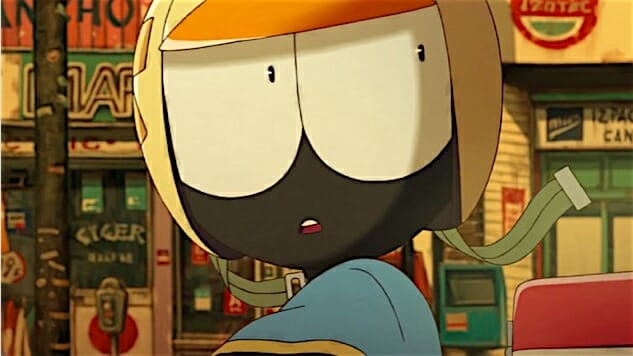
France and Japan have always had something of a cross-continental love affair when it comes to art. From the impact of ukiyo-e prints on the rise of impressionism to the influence of Jean “Moebius” Giraud’s bandes dessinée comics on artists like Hayao Miyazaki and Katsuhiro Otomo, the aesthetic trajectories of these two countries have been in constant conversation with one another throughout history. MFKZ is only the latest link in this chain of cultural exchange, an international work whose origins stress the fault lines what can be known as “anime” or “world animation.”
Co-directed by Studio 4°C’s Shojiro Nishimi and comic author Guillaume “Run” Renard, MFKZ is adapted from Renard’s original comic Mutafukaz and follows Angelino, a onyx-skinned young man eking out a life of minimum wage survival in Dark Meat City, a funhouse mirror depiction of South Central Los Angeles by way of Brazilian Favelas. Angelino’s meek and unassuming life is upended when he crosses paths with a mysterious young woman and subsequently gets into an moped accident. Waking up with a splitting headache and suddenly ensnared in a centuries-old conspiracy by shadowy government agents, Angelino and his friends Vinz and Willy must find a way to escape the city alive, all the while uncovering the secrets of Angelino’s own forgotten past.
The concept of MFKZ has existed in some form or another for over two decades now, with the comic and an accompanying short film titled, Operation Blackhead in 2003 and animated by Renard himself. In interviews followingMFKZ’s initial festival circuit, Renard has cited the comic and movie as being a mash-up of “John Carpenter’s They Live meets Boyz n the Hood.” Given how prolific those influences in their respective orbits of pop culture, no one would accuse MFKZ of being modest in paying homage to them.
In a lot of ways MFKZ feels like a spiritual bookend of sorts to Tekkonkinkreet, another Studio 4°C production. Released in 2006, Tekkonkinkreet was notable for being the first Japanese animated film to be helmed by a non-Japanese director, Michael Arias. Aside from Nishimi and Shinji Kimura, art director on Tekkonkinkreet, returning to collaborate again on MFKZ, comparing these films and their respective settings and scenarios reveals some interesting parallels.
Tekkonkinkrett’s Treasure Town is a city of the past being engulfed by the new—a pan-asian industrial sprawl being gutted by opportunistic “foreigners” at the expense of disenfranchised locals. In the case of MFKZ, the stakes are global, but the film’s story is localized to South Central L.A., where wealth disparity and pollution are exacerbated through neglect and deliberate malice. Each city is host to a diasporic community of gangsters, roughnecks, wide-eyed children and the occasional anthropomorphic oddity trying to make this thing called “life” work, day by day.
That MFKZ, a film depicting a West Coast American city authored through the vision of french artist and animated by a Japanese studio, would follow nearly 12 years after the release of Tekkonkinkreet, a Japanese manga-turned-anime of a pan-asian metropolis directed by an American animator, only illustrates how starkly the evolution of the aesthetic and cultural signifiers of what is known as “anime” has shifted in that span of time.
That said, MFKZ itself leaves something to be desired. While the action and 3D animation are exceptional, per the expertise of 4°C and Akama Entertainment, the film’s second act peters out and loses its grasp in terms of satisfactorily tying off its plot threads by film’s end. The idea of systemic greed and global warming in the modern age being attributable to an occupying force of shapeshifting extraterrestrials was novel when Carpenter did it back in the ’80s, but here it feels like a half-hearted recitation of a well-worn trope.
The film’s conclusion ends on a total non-sequitur, suggesting that crucial portions of the original comic’s story were left on the cutting room floor during production. In addition, while MFKZ’s English dub boasts a number of heavy-hitting names such as Giancarlo Esposito and Danny Trejo, few performances (with the exception of RZA’s turn as the Hamlet-quoting gangster Shakespeare) are given the space to make these characters their own. Most disappointingly is Vince Staples, who through no fault of his own feels underserved by flat dialogue written for Angelino’s fire-headed friend, Vinz.
Among the film’s positive notes is the soundtrack, courtesy of french producers Guillaume Houzé and The Toxic Avenger. An eclectic mix of boombap hip-hop, electronica and dub reggaeton, the score is as eccentric and fast as the action it accompanies. One scene worth noting in particular is a high-speed chase sequence involving an ice-cream truck wherein the truck’s jingle is diegetically interpolated into the hook of a beat.
MFKZ is a labor of perseverance, and it shows. While it flares up before fizzling out in its final moments, the view is admittedly entertaining and worth witnessing if only to relish in the thrill of its visual excess. Whether MFKZ is an end in of itself or the entry in a larger series to come, it’s a marvel to see such an avowed international effort stake its claim to legitimacy amidst the medium’s global transformation.
Directors: Shojiro Nishimi (as Shoujirou Nishimi), Guillaume Renard
Writer: Guillaume Renard
Starring: Tay Lee, Mark Ryan Haltom, Ray Chung, Alp Altiner, Darnell Gene Johnson Jr., Brita Hong, Victor Nguyen
Release Date: October 11, 2018
Toussaint Egan is a culturally omnivorous writer who has written for several publications, including Kill Screen, Playboy, Mental Floss, and Paste. Give him a shout on Twitter.